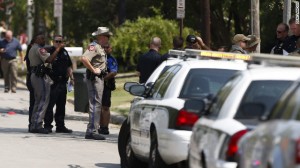
I just got a news update on my iPhone saying that police had shot and killed a gunman at Texas A&M University this afternoon. The details are sketchy right now but it made me think about the importance of campus alert systems and some of the questions parents need to ask during the selection process.
Texas A&M responded quickly:
Texas A&M issued a Code Maroon — the university’s emergency notification system — at 12:29 p.m. CT (1:29 p.m. ET), telling people to avoid the area where there was a report of an “active shooter.” The entire ordeal lasted around 15 minutes, with an 12:44 p.m. update also posted on the university’s website indicating the alleged gunman was by then “in custody.”
Every parent of college-bound teens should ask this question during the campus visit (preferably not in the presence of your student):
What systems do you have in place to protect my child in the event of an emergency such as the Virginia Tech shooting?
The American Council on Education published a list of questions school leaders should ask themsleves. Parents should expect answers to these questions when discussing this issue with campus security:
- Has the school done a full assessment of potential catastrophic risks, and does it have plans in place to address these risks?
- Does the school have an appropriate emergency team in place? Do team members regularly participate in emergency preparedness exercises?
- Does the school have multiple means to communicate with students, faculty, and visitors in the event of an immediate, ongoing emergency situation? Do plans exist to direct people to a safe location?
- What communication and coordination networks exist among campus security leadership, local law enforcement, political officials, first responders, and health officials, both on an ongoing basis and in case of emergency? Is there a specific integrated emergency response plan? Do all the agencies who might be involved in emergency run drills on campus to prepare?
- Is the training of campus security personnel appropriate to potential risks?
The president of Virginia Tech also mandated several internal reviews following the VT tragedy to evaluate the school’s existing emergency plan. The review committees’ recommendations included the following (things you should expect from your own school’s emergency plan):
- Classroom door locks that are modified.
- Video surveillance cameras, centrally located and monitored.
- Electronic key cards for controlled access to facilities.
- Mass communication outlets (e.g., phones and Internet access) within classrooms.
- Frequent emergency drills.
- Emergency response protocol with awareness education.
- Campus security committee and master plan.
Before sending your child off to college, do your homework. Make sure that if something bad does happen, the incident and the students get the attention they deserve. If you know the plan and have assurance that the college has implemented specific procedures to facilitate it, you will worry less and sleep better at night.
More on campus safety:
6 Talking Points on Campus Safety
Prepping your college-bound student in campus safety
